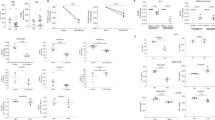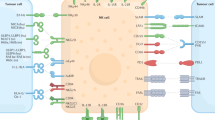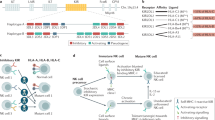Abstract
The in vivo and in vitro effects of human alpha-interferon (IFN) on blood natural killer (NK) cell activity were studied in patients with malignant melanoma. The initial response to an i.m. injection of IFN was a depression of blood NK cell activity, being detectable at 4 h and reaching a nadir at 12 h. Blood NK cell activity returned to or exceeded pretreatment levels within 24 h. The frequency of large granular lymphocytes among peripheral blood lymphocytes (PBL), however, remained unchanged during the first 24 h of IFN treatment. In a single cell cytotoxicity assay in agarose the number of lymphocytes forming conjugates with K562 target cells was not affected at 12-h points of IFN treatment, while the frequency of lytic conjugates with dead target cells was decreased by 12 h. Thus, the number of active NK cells was reduced by IFN administration. While in vitro exposure to IFN resulted in an augmentation of NK cell activity of PBL from untreated patients, IFN failed to enhance the activity of PBL obtained 12 h post IFN injection. When PBL obtained 12 h after IFN injection were cultured overnight, they recovered their responsiveness to NK-boosting effects of IFN. Blood monocytes obtained at 12-h points from IFN-treated patients suppressed IFN-induced enhancement of NK cell activity, although these monocytes did not inhibit the base line level of NK cell activity. In contrast, the streptococcal preparation OK432 was able to augment NK cell activity of PBL obtained 12 h post IFN administration and of control PBL even in the presence of suppressor monocytes. PBL obtained 24 h post IFN injection expressing enhanced NK cell activity were also unresponsive to IFN in vitro. However, monocytes obtained 24 h after IFN injection were no longer able to inhibit IFN-induced augmentation of NK cell activity. These results indicate that in vivo administration of IFN-alpha to cancer patients results in rapid and transient generation of suppressor monocytes capable of inhibiting IFN-dependent development of functional NK cell activity, which could be responsible for the initial and transient decline in blood NK cell activity.
This is a preview of subscription content, access via your institution
Access options
Subscribe to this journal
Receive 24 print issues and online access
$259.00 per year
only $10.79 per issue
Buy this article
- Purchase on Springer Link
- Instant access to full article PDF
Prices may be subject to local taxes which are calculated during checkout
Similar content being viewed by others
Rights and permissions
About this article
Cite this article
Uchida, A., Yanagawa, E., Kokoschka, E. et al. In vitro modulation of human natural killer cell activity by interferon: Generation of adherent suppressor cells. Br J Cancer 50, 483–492 (1984). https://doi.org/10.1038/bjc.1984.205
Issue Date:
DOI: https://doi.org/10.1038/bjc.1984.205
This article is cited by
-
Effects of Interferons and Cytokines on Melanoma Cells
Journal of Investigative Dermatology (1993)



